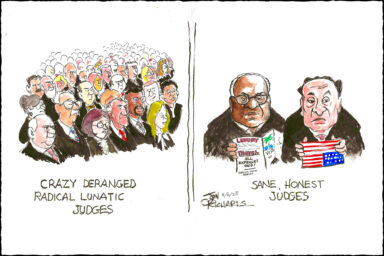Billionaires Want to Live Forever
The ultimate luxury is longevity.
|
Listen To This Story
|
What are we to make of billionaires who want to live forever? This isn’t a theoretical question. A handful of them are funding startups to extend longevity — specifically, their longevity.
Companies like Juvenescence, Calico, Elevian, and Altos Labs are being bankrolled by billionaires such Yuri Milner, Jeff Bezos, Sergey Brin, and Larry Page, all trying to learn how to regenerate portions of the body. These old white men, some now reaching their 60s, are essentially trying to buy the fountain of youth. As it’s often been said, young people want to be rich, and rich people want to be young. It’s a tricky remit, and so far, while trying to “reprogram” mice, all scientists have managed to do is give some mice embryonic tumors. But the billionaires are sticking with it, with the ultimate goal of extending their comfy lifestyles.
People on the lower end of the financial spectrum feel differently. According to The Guardian, only 35 percent of “ordinary” people even want to reach 100. You can fill in the questionnaire yourself why this is the case (climate change, food insecurity, the Marvel universe, etc.), but it still leaves 65 percent trying to get that century under their thinning belts. The billionaires want to go way past that, perhaps living in their luxury biodomes with all the plants and videogames they need to sustain a truly meaningless eternity.
Well, “eternity.” That might be pushing the luxury yacht out a bit, when “senescent cell replenishment” is in its infancy.
In the olden days, wealthy people were content to live well as opposed to long. Living well was not the same as living healthily; it was a decadent lifestyle, and a common ailment of the wealthy was gout, an inflammation of the ankles from eating too much rich food. This shameless malady left people fat and weakened, sometimes unable to easily walk across a marbled ballroom floor.
The famous caricaturist James Gillray (1756 –1815) delighted in depicting these hapless oafs, one of whom was the astonishingly self-centered prince regent, later King George IV (1762-1830). He had all that borrowed wealth could bestow (he was forever in debt), and built such grand and lasting follies as the Brighton Pavilion, and more fleeting palaces such as his Carlton House on the Mall in London. He achieved immortality due to his fashionable style, known as Regency, still admired to this day. His beneficiary, the architect John Nash who actually designed these great edifices, didn’t get so much as a “Nashism.”
But that’s what wealth does: It stamps your name on things. This became complicated when the Lincoln Center people had to sandblast Avery Fisher’s name off his namesake hall when David Geffin, who’d ponied up $100 million for the refit, insisted on his own moniker on the building’s façade. No anonymous donor he. So the music hall’s administration had to pay off the Avery Fisher family to the tune of $15 million to make up for this indignity, further adding to the cost.
Artists, of course, can obtain a kind of immortality due to their legacy, their paintings admired, their music played, their films watched. The tragedy of their dying is the unfinished work. George Gershwin’s death at 38, or Mozart’s at 35, are far greater losses than Larry Ellison being able to live to a grand old age. Of course, not even every artist agrees, and as Woody Allen memorably said, “I don’t want to achieve immortality through my work; I want to achieve immortality through not dying.”
The Sackler family may not be trying to extend their own lives beyond the usual luxury living, but they’ve been instrumental in shortening the lives of hundreds of thousands through their development and sale of pharmaceutical opioids. They’ve had their own name sandblasted off countless buildings, after using their largesse to try to whitewash the family moniker. God knows if they even have a shot at redemption. I’d say unlikely.

In Italy in the 15th century, the Medici and Borgias liked to have a pope in the family to look after their own spiritual lives while they chased after wealth, built their palaces, designed their gardens, and conducted their ruthless business activities, often with the help of poison and knives. Although plagues could carry them off along with the rest of the populace, having cousins ensconced in the Vatican at least guaranteed good seats in heaven (or so they believed).
These families have attained immortality in our current era by virtue of the art treasures they amassed. Being the greatest patrons of their time, they’ve left namesake palaces, containing the greatest treasures of their age. (By contrast, their taste in interior decorating, if a recent visit to the Palazzo Medici in Florence is anything to go by, was pretty ghastly.) But despite their ruthlessness, neither family has suffered the shame of the Sacklers. As Harry Lime remarks admiringly in The Third Man, “In Italy for 30 years under the Borgias they had warfare, terror, murder, and bloodshed, but they produced Michelangelo, Leonardo da Vinci, and the Renaissance. In Switzerland they had brotherly love. They had 500 years of democracy and peace, and what did that produce? The cuckoo clock.”
It’s that cuckoo clock that has stymied our modern-day billionaires, staring at the time and worrying about their own mortality. Will we remember their names? Will they care? We probably won’t even be around when they’re still busy designing their new rockets.
It’s been noted that this billionaire boys’ rocket club is little more than an attempt to exploit space, to slip the surly bonds of Earth and punch the face of God (to grossly misquote John Gillespie Magee’s famous poem). Jeff Bezos (with Blue Origin), Elon Musk (SpaceX) and Richard Branson (Virgin Galactic) tried to frame their forays into suborbital space as a boon for private enterprise and cosmic exploration. But even beyond the narcissistic “boys with toys” element, these expensive projects have quickly become tied to their preoccupation with an escape from mortality. Many suspect their ultimate collective goal is to leave earth to live in some space station or even set down their company flags on Mars.
The public has reportedly turned against this kind of space tourism, just as the billionaire’s nontaxpaying ways are trying a lot of people’s patience (though not half the government’s). But though most people would claim to share these richies’ interest in living forever, I, for one, would rather stay down in this chaotic world than share a rocket with the likes of Bezos, Musk, or Branson. They can try for eternity. I’ll take my luck on the planet on which I was born, and enjoy all the time I’m given. Whatever it turns out to be.
—
J.B. Miller is an American writer living in England, and is the author of My Life in Action Painting and The Satanic Nurses and Other Literary Parodies.




